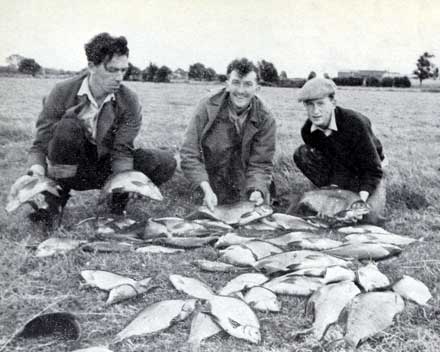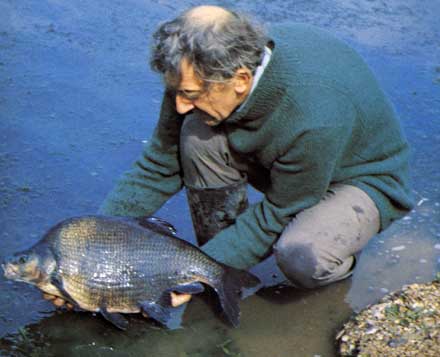| CATCH MORE FISH Do this, do that, catch more fish! Every which way you turn you simply can’t avoid it. Everyone is exhorting you to catch more fish. Whether tackle manufacturers, bait producers, magazines, newspapers or even FISHINGmagic, they’re all trying to persuade you that following the purchase of their product or by following their advice you’ll catch more. And of course, there is nothing whatsoever wrong with that advice. But is it the path to angling happiness? Perhaps it’s a little more complex than simply catching more or ever bigger fish. There is a paradox in angling; take the fish catching out and it’s no longer angling. Make it too easy and it loses the challenge, yet make it too difficult and few have the perseverance to ever succeed, especially those whose time is limited by family life and work. The evolution rate of fish in changing their basic habits is far behind our technological advances yet we still struggle to truly understand our quarry and think that quick fixes will ensure success. But the relative importance of fish catching changes for all of us as anglers through our lives. As they say in America, if it was easy they’d call it “catching”. That great angler, Dick Walker, once (probably more) described the stages of development that an angler might progress through in his or her angling career. Few get to the end but it’s worth me trying to describe those stages. The absolute beginner is probably happy to catch any fish, almost regardless of size. Once the simple task of catching a fish has been achieved, the second step is usually moving on to catching as many fish as possible. Some never get past this, and perhaps develop into life-long match anglers. But for others this changes into a desire to catch a big fish. Not necessarily a monster but something that pulls back. As our angler’s skills develop, this may develop further into concerted concentration on catching ever bigger fish, ultimately even THE biggest fish – a specimen hunter is born. You might think that this was the end of the road but the next stage is sometimes the desire to actually own and develop a fishery of one’s own. Many dream of this but few put it into practice, the twin obstacles of time and money getting in the way. After a while, a curious change occurs in the dedicated angler. Having mastery of his own fishery, his own desire to catch fish from it declines though he is often keen to share in the success of others in catching the fish from his fishery. At this point, the angler has reached a zenith in his angling career in that the satisfaction that he is achieving is not from his own catching of fish.
This model is over-simplified, for many anglers enjoy various branches of the sport, and can switch effortlessly from match fishing to specimen hunting to flyfishing or sea fishing, and enjoy all equally. Others derive pleasure from tackle development, such as fly-tying or float making, from angling photography or writing, and that can include collecting books as well as actually writing books or articles. Some become armchair fishermen or angling administrators, and again may become detached from the actual catching of fish. There is more to fishing than catching fish, and I think these examples illustrate this. Those that disagree can often be quickly pinpointed as still being at an early stage of their angling career, even though they may be extremely successful match anglers or specimen hunters with decades of angling behind them. Yet others have had many successes in the past and are finally simply content to get out on the riverbank occasionally and enjoy the fresh air with no pressure to succeed whatsoever. Let’s look at some of my categories and define their pleasure, and see if I can identify some famous examples. The Bag-up Merchants These are the anglers that will go to a lot of trouble to pinpoint the best swims, to get involved in complex pre-baiting regimes, or try to bag the best swims at the start of the season. Huge weights of bream, chub, it doesn’t really matter as long as the bag can be measured in stones, or preferably hundredweights. The late and great Peter Stone had a long spell of Thames bream bashing back in the sixties. He was only cured when, fishing with Dick Walker on a Sunday, having caught yet another huge bag of bream the previous day, he remarked about his latest catch to Walker. Walker curtly asked him just how many bream he needed to catch, and suggested that it was time for some new challenges. Stone recognised that he needed to move on, and left the bream bashing alone (not the really big ones though) for decades. I think most anglers in this situation eventually recognise the monotony of hauling in endless bream or medium sized chub, and look for new challenges. It’s okay once in a while maybe, but not as a way of life, so if you find yourself in this category perhaps you should be asking whether more is better. The Specimen Hunters
Bigger is better! And why not? Yet, the quest to catch ever bigger fish can be self-defeating, especially if the opportunities to catch big fish dry up. Plenty of fishing venues are subject to cycles, and the six-pound chub of today might not be around in five years. Is the keen specimen hunter going to be satisfied with mere four pounders? Match fishing is competitive by definition yet such competitiveness creeps in to specimen hunting with a vengeance, aided and abetted by big fish competitions. Other factors come in, with relative merits of fish caught being discussed, as if such factors have any relevance at all. Provided a sense of proportion remains, there is nothing wrong with catching big fish. One of the dangers in this obsessive approach is that the fish catching becomes a job. Rod hours take over from effective fishing, or rushing to the latest hot venue or swim ( When you purchase through links on our site, we may earn an affiliate commission, which supports our community.
|
Welcome!Log into your account












